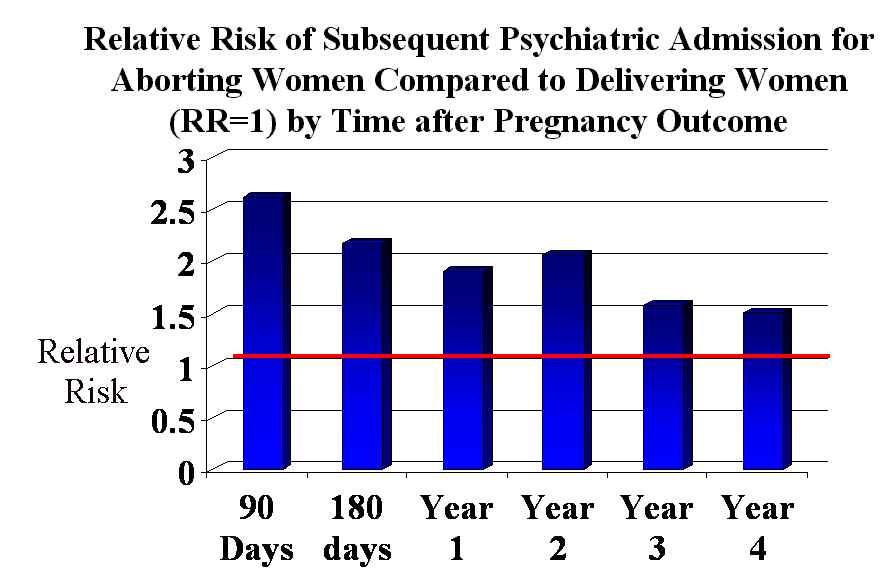Severe Psychiatric Problems Higher After Abortion: New Study
Springfield, Ill. (May 13, 2003) — Is abortion a benign experience for women? Or can it cause or contribute to emotional problems, even severe ones?
The American Psychological Association (APA), which has consistently lobbied in favor of abortion rights, has frequently insisted that abortion is a benign experience that predominately brings relief to most women.
Some APA members, such as Nancy Adler and Brenda Major of the University of California, have even charged that those who say abortion can cause emotional problems are guilty of misleading the public. To support this view, Adler has argued that abortion is so common that if it did cause emotional problems, the nation’s psychiatric wards would be filled with the evidence.
Now, a new study published in the latest issue of the Canadian Medical Association Journal (CMAJ) shows that such evidence does exist. A review of the medical records of 56,741 California medicaid patients revealed that women who had abortions were 2.6 times more likely than delivering women to be hospitalized for psychiatric treatment in the first 90 days following abortion or delivery.
Depressive psychosis was the most common diagnosis. Rates of psychiatric treatment remained significantly higher for at least four years. A previously published study by the same authors revealed that women who had abortions were also more likely to require subsequent outpatient mental health care.
According to the CMAJ study’s lead author, David Reardon, Ph.D., a common complaint among participants in post-abortion recovery programs is that when they raised the issue of their past abortions while seeking mental health care, their therapists dismissed abortion as irrelevant.
“Therapists who fixate on the ‘abortion is benign’ theory, either out of ignorance or allegiance to defensive political views on abortion, are doing a great disservice to women who need understanding and support,” said Reardon, who recently co-authored a book, Forbidden Grief: The Unspoken Pain of Abortion. “This study, based on objective medical records, validates the claims of tens of thousands of women in post-abortion recovery programs.”
In an effort to offer an opposing view, CMAJ editors invited psychologist Brenda Major, an advocate for the view that abortion is therapeutic, to submit a commentary on the study appearing in the same issue of the CMAJ. In her commentary, Major charged that the study’s implication that abortion can cause psychiatric problems is misleading. She argued other factors, such as marital status or prior psychological problems, may offer better explanations for the fact that psychiatric problems are more common among aborting women.
Reardon concedes that these other factors may also contribute to psychiatric illness but insists that abortion can both aggravate pre-existing problems and trigger new ones. He dismissed Major’s commentary as a product of “the abortion distortion effect.”
Reardon particularly questioned Major’s choice to omit from her comments any mention her own study recently published in the Archives of General Psychiatry. That study revealed that 1.4 percent of the women interviewed two years after their abortions suffered from post-traumatic stress disorder solely attributable to their abortions.
Even such a low percentage, projected on the 1.3 million American women undergoing abortions each year, would result in 18,200 cases of PTSD each year, or over a half million cases since 1973. Including other types of negative reactions, Reardon said, could easily increase the overall complication rate by twenty times or more.
In an interview with a Canadian reporter, Major called Reardon’s comparison “outrageous” and “muddy.” In response to these comments Reardon noted that the method used was exactly that previously employed by one of Major’s co-authors, Dr. Henry David, who did a similar analysis in 1981 of data from Denmark, only restricted to just 90 days. David found the same trend toward higher admission rates among women who had abortions.
“Major has never criticized David’s work,” Reardon said. “But perhaps this is because he is a vocal advocate for abortion and a colleague who has collaborated with her on dismissing the importance of his own findings. The simple fact is that David did not follow up on his own work. Now, Major and others are criticizing us for simply doing what they should have done when they first spotted evidence of elevated psychiatric admissions after an abortion over twenty years ago. Major’s outrage is a reflection of her politics. I don’t think she will ever acknowledge any research findings that run counter to her bias.”
This is the seventh study Reardon and his colleagues have published on abortion complications in the last eighteen months. Among the other studies, also published in major peer reviewed journals, one revealed that among women with an unintended first pregnancy, those who had abortions were at significantly higher risk of clinical depression an average of eight years later compared to similar women who carried their unintended first pregnancies to term. Higher rates of suicide and substance abuse among women who had abortions were also revealed in the other studies published by the research team.
Study Citation
Reardon DC, Cougle JR, Rue VM, Shuping MW, Coleman PK, Ney PG.Psychiatric admissions of low income women following abortion and childbirth. Can Med Assoc J. CMAJ 2003; 168(10):1253-7.
The full study is available free online at the CMAJ web site.

